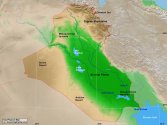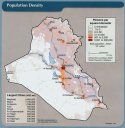In light of Israeli threats...what does Iran's threat to review its nuclear doctrine mean?
In light of the mutual responses between Iran and Israel, and the increasing fears that the tension between them could turn into a nuclear catastrophe in light of the sabotage operations that targeted nuclear facilities in Iran during the past years, Tehran threatened “the possibility of reviewing its nuclear doctrine.”
The Commander of Iran’s Nuclear Facilities Protection Authority, Brigadier General Ahmed Haqq Talab, said last Thursday, “If the Zionist entity wants to threaten to attack Iranian nuclear centers, it is likely we will review Iran’s nuclear doctrine and policies and abandon previously announced considerations,” adding, “Our hands are on the trigger and we have identified Israeli nuclear facilities as the target.”
For his part, Dr. Mohsen Jalilund at the University of Tehran, who is known for following Tehran's nuclear program, believes that the nuclear agreement has become a thing of the past and only a dead body remains of it, and that threats to abandon the nuclear conventions and treaties suggest a perception of an existential threat that justifies the targeted countries to take deterrent decisions.
Nuclear threshold
Pointing out that his country has confirmed more than once that it has reached the nuclear threshold, while noting that it does not intend to manufacture an atomic bomb based on the fatwa of the religious authority, Jalilund believes that the Islamic Republic is actually capable of implementing this threat within a few hours or days.
According to the information available to him, Tehran did not target any of the Israeli nuclear facilities in its direct attack on Israel, but it deliberately targeted an air base close to the Dimona reactor, to demonstrate its ability to target the latter if Tel Aviv ventured to target the Iranian nuclear facilities.
Jalilund concluded that the threat to reconsider Tehran's nuclear doctrine came from a military leader, not a political official, and that the official authorities deliberately did not comment on it to leave room for different interpretations.
The head of the Strategic Council for Foreign Policy in Iran, Kamal Kharazi, confirmed in 2022 - in an interview with Al Jazeera - that his country has the technical capabilities to manufacture a nuclear bomb, adding that there is no decision yet in Tehran to manufacture the bomb.
On the other hand, a group of Iranian observers believe that the declared position on changing the nuclear doctrine is thoughtful and coordinated, and those who support this trend reinforce their analysis with the media coverage that Brigadier General Haq Talab’s statements received and the official authorities not rejecting what he said.
Strategic researcher Ali Reza Taqavinia points out that for the first time his country is threatening to change its nuclear doctrine through the words of a senior official in the Revolutionary Guards, and Israel - before anyone else - must take these statements seriously.
When referring to Israeli threats to strike Iranian nuclear facilities, Taqavi Nia recalls the proverb, “He whose house is made of glass should not throw stones at people,” stressing his country’s ability to become the tenth nuclear power in the world if it changes its nuclear policy by order of the Supreme Leader, Ayatollah. Ali Khamenei.
_________________________________
Iran does not have nukes however It would probably take Iran weeks or months to build nuclear weapons like what col Macgregor said in his interview on youtube. not "hours or days" like what that Dr. from the Tehran university said.
23:20
Israel is ruled by lunatics who would undoubtibly use nukes. Iran must build a nuclear arsenal secretly ofcourse and reveal it once the arsenal is ready.
Some pro-Iran people say Iran already has nukes, personaly I believe that is just wishful thinking. Deterence only works when everybody knows you have nukes. Take Israel for example, even though Israel has not declared it has nukes yet every one knows they are a nuclear power.


